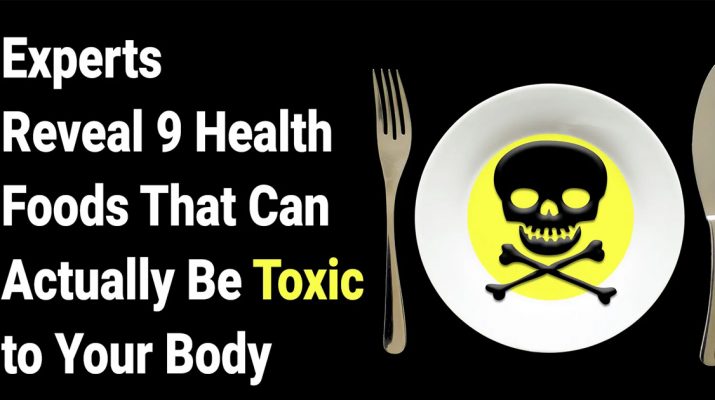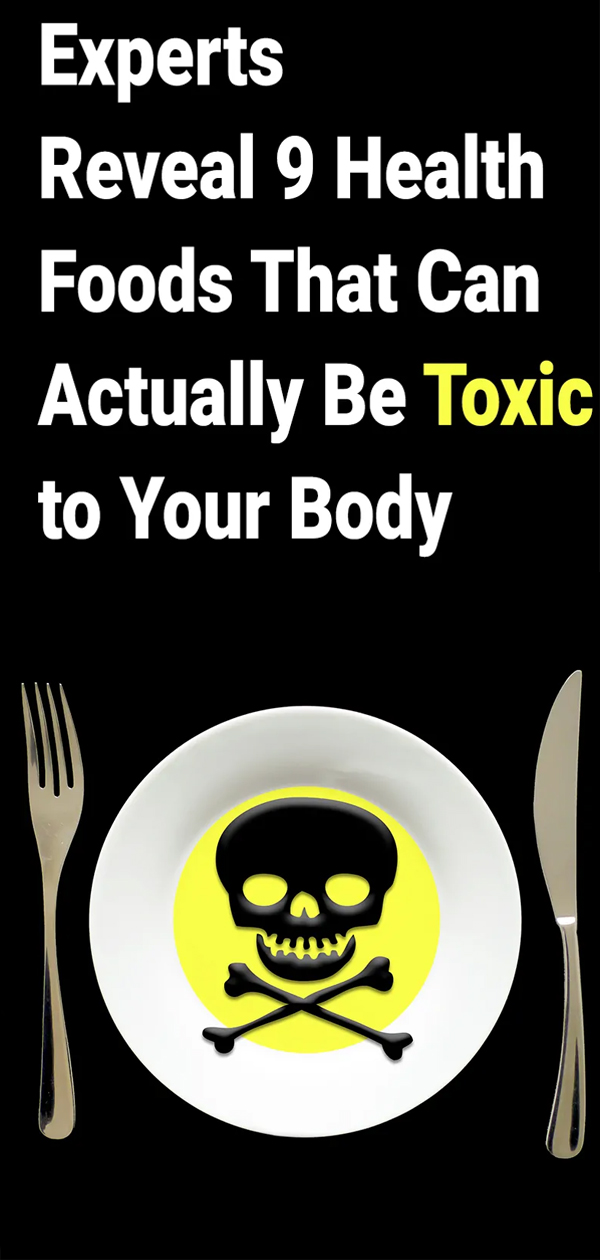There are usually specific foods that are considered healthy.
When people try to change their diets to achieve positive changes, they turn to these healthy foods to improve their nutrient intake and achieve their health goals. However, there are foods that are considered healthy that may be toxic to your body. Watching out for these health foods can help keep you healthy and safe.
Here Are 9 Surprising Health Foods That May Be Toxic To Your Body:
1. Tomatoes
Even though tomatoes are healthy to add to the diet, they are considered a “nightshade plant.” Unfortunately, people who have been diagnosed with fibromyalgia should avoid nightshade plants, like tomatoes. Even though many nightshade plants are very healthy and nutritious, they can aggravate symptoms for people with chronic pain, like those with fibromyalgia. They can even trigger a flare of symptoms in some people.
If you do not experience worsening symptoms when eating tomatoes or other nightshade plants, it is recommended you keep them in your diet because of their nutritional value. If you do not have chronic pain in your body, like that associated with fibromyalgia, it is unlikely you will have trouble with nightshade plants.
2. Alfalfa Sprouts
Sprouts are supposed to be very healthy in almost any form. Many people add them to their foods to get extra boosts of vitamins and nutrients like vitamins C and K, along with fiber and folate, among others. In addition, since these sprouts are raw, they have not been changed in the manufacturing process, contributing to their health value. There are no added sugars, preservatives, or chemicals. Instead, only the good vitamins and nutrients are consumed.
Unfortunately, for people undergoing cancer treatment, alfalfa sprouts (and other types of sprouts) can be potentially toxic. When people undergo cancer treatment, their immune systems are compromised. They are at risk for developing illnesses and infections more easily. As a result, they have to take extra precautions in food preparation and consumption.
Raw alfalfa sprouts put cancer patients at risk for food poisoning, even if they have eaten sprouts in the past with no problem. Once cancer patients have been cleared by their oncologists or another trusted medical expert, they can return to eating alfalfa sprouts. Those who are not undergoing cancer treatment have no need to take this precaution. Check with a medical expert to determine if this is something you should be worried about.
3. Dairy
Many dairy products can be a good source of healthy fats and protein. One of the primary draws of dairy for many people is calcium, which strengthens teeth and bones. Dairy is also a good, healthy source of protein.
However, people who have been diagnosed with rosacea may find that dairy products exacerbate their symptoms and may even cause additional symptoms, such as the development of acne. Often, people with rosacea are already sensitive to dairy products. They may even have been diagnosed as lactose intolerant or sensitive before being diagnosed with rosacea. Avoiding dairy can help prevent rosacea flare-ups, and there are alternate sources of calcium and protein for rosacea sufferers.
Those without rosacea may still have problems with dairy, but most people can consume dairy without any health problems.
4. White Rice
Though excessive amounts of white rice is probably not helpful, many people see it as a healthy alternative to pasta and breads, especially in small amounts. When paired with healthy proteins and vegetables, white rice can be viewed as a very healthy food.
However, this is not true if you have diabetes. Rice is a carbohydrate. Once it is in your body, it begins to act like sugar as it is digested. When that happens, glucose levels rise. This is problematic for diabetics and a primary reason people must take insulin after they have been diagnosed with type 2 diabetes. It is recommended that diabetics replace white rice, along with white bread and flour, with whole grains instead.
White rice, especially in smaller amounts, is healthier than many breads and pastas. For those who can consume carbohydrates, white rice is probably not problematic in the diet. However, whole grains would still be a better choice.
5. Canned Vegetables
Vegetables are very healthy. They are rich in vitamins and nutrients. Most often, when people try to eat healthier, the first thing they do is add more vegetables to their diets. While some vegetables are more nutrient-dense than others, they are all usually good calories.
If you have heart disease, canned vegetables can be bad for you. When vegetables are canned, there is usually sodium added. Sometimes it can be a lot of added sodium. If you buy canned vegetables, check the label for “low sodium” or “no salt added” for healthier options. Even better, skipped the canned vegetables and go for fresh and frozen instead.
6. Eggs
Even though eggs are a good source of protein and offer a lot of variety for your meal planning, they can be toxic for people with asthma.
Egg allergies are the most common among children. While children may outgrow them, the allergic reactions can remain. Unfortunately, asthmatic symptoms can be an allergic reaction to an egg allergy. That means if you have an egg allergy and eat eggs, it could trigger a potentially dangerous asthma attack.
If you have an egg allergy and asthma, it is best to simply avoid eggs. There are other sources of protein and healthy fats you can use instead of eggs. If you have to avoid eggs, be sure to check all labels carefully. Eggs can be found in lots of surprising foods. Other foods may be manufactured in plants that also handle eggs. All ingredients should be labeled clearly. If you’re at a restaurant, be sure to ask about meals you’re uncertain of.
7. Omega 6 Fatty Acids
Omega 6 fatty acids are essential for proper growth and development. Throughout your life, you need to make sure your omega 6 and omega 3 fatty acids are in balance. Omega 6 fatty acids can be found in cooking oils as well as in mayonnaise and salad dressings.
However, if you have arthritis, it is even more important to limit the amount of omega 6 fatty acids in your diet. If you consume too much, omega 6 fatty acids can trigger pro-inflammatory chemical production in the body. This can exacerbate arthritis symptoms.
It’s important to remember that omega 6 fatty acids are not bad. They are fatty acids needed in the body. The problem is in the amount of consumption, especially for people who have arthritis.
8. Beef
Beef is one of the biggest sources of protein and iron in people’s diets. However, beef is high-fat meat that contains a lot of unsaturated fats. This is usually not a big problem for healthy people. However, for people who have or are at risk for dementia and Alzheimer’s, moderate or high intake of unsaturated fats are associated with the development of dementia.
Instead of beef or other high-fat meats, it is recommended to select leaner sources of protein like fish and legumes. Light-meat poultry can also be used in place of high-fat meats. These are options that provide high levels of protein but don’t have a negative impact on your health.
9. Wheat Bran
Wheat bran is a great source of fiber. If a doctor recommends increasing fiber, wheat bran is probably the first suggestion made. But for some people, it is necessary to find a different source of fiber. Wheat bran has a high concentration of phytic acid, which binds to mood minerals. People with depression and anxiety who use wheat bran to increase fiber are likely to see an increase in their symptoms.
Soaking and cooking foods that contain phytic acid, like whole grains and dried beans, can help reduce the effects on depression and anxiety so you can get the added fiber without making symptoms worse.
Most of these health foods are still healthy for most people. However, if you have any of these conditions, it’s important to ensure that the foods you eat don’t make symptoms worse. That way, you can achieve your positive health goals without having to worry about making other conditions worse.


